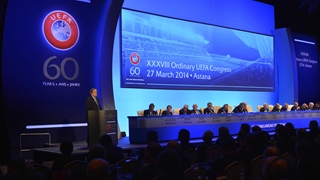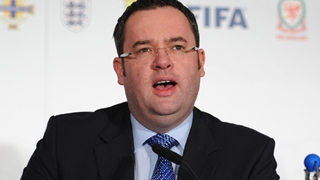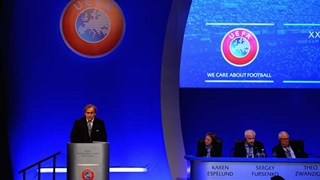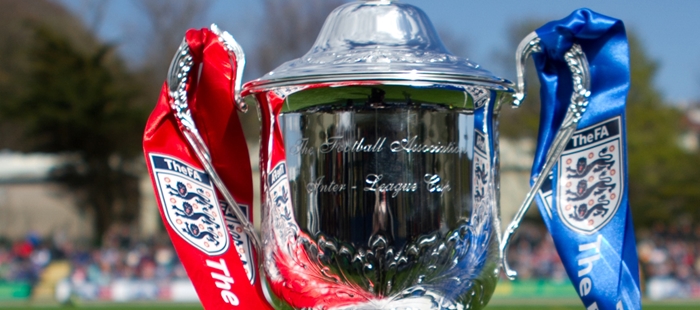
The Football Association has backed the new UEFA Nations League after it was passed unanimously at the 38th UEFA Congress in Astana, Kazakhstan.
The FA was represented by chairman Greg Dyke, general secretary Alex Horne and vice-chairman David Gill, who was also present as a UEFA Executive Committee member.
As well as the new look international match calendar, a resolution on integrity in football to tackle the threat of match-fixing was also passed by the 54 countries present.
The UEFA Nations League will kick-off in the latter part of 2018, to complement the usual European qualifying programmes.
Addressing delegates at the Palace of Independence in the Kazakh capital, UEFA president Michel Platini said: "This is a very important decision for the future of football at the level of our national teams. Congratulations, I think you have made the right choice."
The Nations League concept will see countries divided into four divisions using the UEFA coefficient rankings, with each division containing four groups made up of three or four nations. Teams will then play four or six matches between September and November 2018.
The competition will feature promotion and relegation at the end of each cycle, and the format could give the most successful teams access to four spots at UEFA EURO 2020.
That edition of the European Championship will have no host nation, given that it will be played across 13 different cities. The other 20 places will be decided through a traditional qualifying format.
In passing an 11-point resolution entitled “football united for the integrity of the game,” the Congress was told of UEFA’s plan to get tougher on those who are convicted of offences linked to match-fixing. The FA and other associations agreed to:
- Educate their domestic football family by having a coherent plan for education and protection/prevention.
- Harmonise their regulations [minimum standards/abolish statute of limitations].
- Implement reporting/systems/procedures.
- Cooperate with domestic law enforcement agencies.
- Implement strong sanctions for any persons involved in match-fixing.
After confirming the unanimous support from the members, Platini said: "This is a very strong message from Astana to the whole European football family. We are going to transmit this to all governments so they can help us in this battle."
In setting out the resolution, the president added: "This battle is a priority, it is a scourge that is a real threat to our sport… it affects the very soul of our sport.
"Let’s not allow criminal networks to undermine and attack the popularity of our sport… at the kick-off for a match, no-one knows how football ends. If we change that, we will lose everything that is beautiful."
The UEFA president also told members that "you are not alone in this fight" and that it was their responsibility and duty, along with UEFA, to tackle the matter.
On the occasion of European football’s governing body’s 60th anniversary, Platini also used his opening address to also talk about the issue of third-party ownership of players.
He commended English football’s lead role in this area and, addressing FIFA president Sepp Blatter, challenged the global game to take firm action.
"I have been constantly warning for years that this practice [third-party ownership] – which is becoming increasingly widespread – is a danger to our sport," said Platini.
"It threatens the integrity of our competitions, damages football’s image, poses a long-term threat to clubs’ finances and even raises questions about human dignity."
“The English FA were the first to recognise the dangers of this practice and the moral and ethical problems that it poses. ”
Michel Platini UEFA president
"The English FA were the first to recognise the dangers of this practice and the moral and ethical problems that it poses.
"As a result they banned third-party ownership. They acted swiftly and decisively, and I congratulate them on that. However, this is a global problem, and the issue should be regulated at global level."
UEFA also followed on from the anti-racism and discrimination resolution presented at the 2013 Congress in London by confirming a ‘Respect diversity’ conference will be held in Rome this September.
And The FA, along with the other 53 member associations, is to benefit from a new UEFA Children’s Foundation, inaugurated as part of the 60th anniversary celebrations.
Platini revealed: "This foundation will finance programmes helping children in need throughout Europe and around the world. A mechanism will be put in place whereby each national association is able to establish one children’s project in its own country which is fully or partly financed by that foundation."










